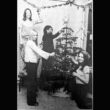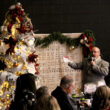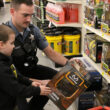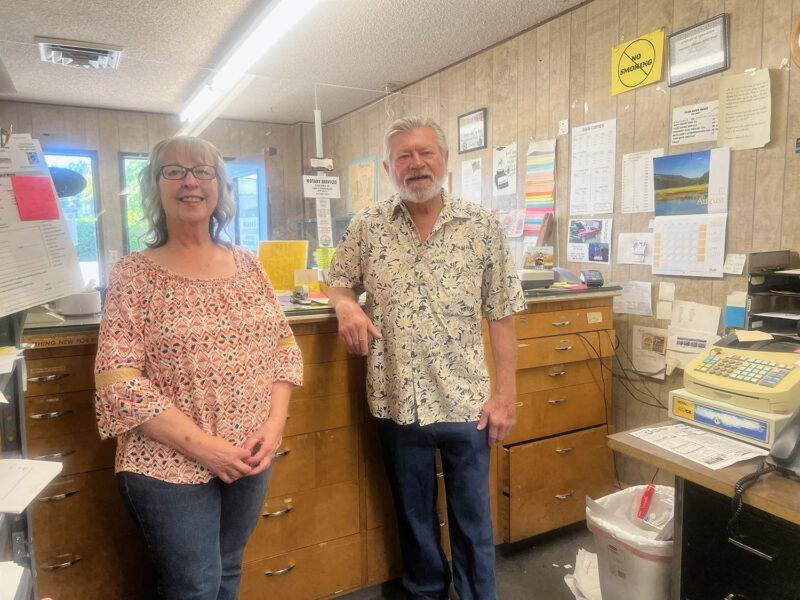Gary Brown and Connie Conner stand in the production area of the building they’ve occupied for the last 32 years – actually long before that for Brown.
It’s the Tell & Sell office at 1304 Long St., caddy-corner from the Sweet Home Post Office.
It’s time to say goodbye. Brown turned 75 in July and Conner is nearing 68.
They’re walking away from the business, turning many of their operations over to The New Era, which has provided many of the services Tell & Sell has, though on a more limited scale.
Brown had been a lead man at a mill on Weirich Drive in Lebanon when “my back got busted up back in ’89” and he and his then-wife Leone decided to branch out from a wedding photography business they’d been operating to take on a new project, the Tell & Sell.
The advertising publication had operated out of the Sweet Home location, once occupied by a car dealership, before the Browns bought it from Doug McInnis of Albany in 1989.
“You’re standing on 3 feet of nothing but 1½-inch round rock,” he told an interviewer, adding that the space below the floor was used to vent auto exhaust during repairs.
Brown believes the publication started “in somebody’s kitchen here in Sweet Home” as far back as 1958 – that’s the earliest copy he’s seen.
“That’s the year I was born,” he said. “That’s how I remember that. I’m the third owner.”
Just a side note: An interview with Gary Brown and Connie Conner is pretty much a microcosm of the last 32 years at Tell & Sell. Brown does most of the talking in a fast-paced patter, laced with specific details that are occasionally and assertively corrected by Conner.
“My brain, I have a very active brain,” he said. “My mother was the same way. My mother wouldn’t go to bed at night. She would sit there and her brain would go there and she’d say, ‘Hey son, get in here.”
“All right, what is it? All right, I guess if that’s what you want, all right, we’ll go do that now.”
Brown said he got a job at Tomco in Cascadia when he was in high school and worked in mills until his injury, though he dabbled in other things as well.
Tell & Sell turned out to be a good fit, though he said he pretty much learned the business from scratch.
“I self-taught myself,” he said. “They taught me a little bit. The presses were hard. I would stay here till 9 at night, running the presses and washing my hands. I had three different offset presses and I learned how to burn the plates. We had to make PMTs (images or text reproduced on photosensitive paper) in the darkroom.
“A lot of brain cells got burned up on these print jobs,” Brown said. “We would go home and think about it overnight: ‘You know, if we do this or that, maybe we can get this thing done.’”
He also had to learn to sell.
“Because I worked in a mill, that took a while, to really go talk to people,” Brown said. “The No. 1 thing Doug said was to ‘Make your presentation and then keep your mouth shut. The next guy that talks will be paying the bill.’ I’m going to be lowering the price for the other guy or he’s going to give in.”
Also, he said, “I had to learn to dress right, instead of wearing a hickory shirt.
“Every Monday I had to make a list of all these people I had to go visit every week. Sometimes I didn’t get lunch because I had to visit all these people.”
The publication has changed over the years, especially as, Conner noted, Craigslist and Facebook began taking a severe toll on paper-based classified advertising.
“Nobody ever thought, back then, ‘What’s the repercussions of this?’”
Though the distribution of Tell & Sell shrank over the years – it was distributed as far away as Corvallis when Brown took over, it still has a place in the community, he said.
Plus, “I’m the only print shop around here,” he said, noting that competitors in neighboring communities are also retiring or getting close.
Conner arrived at Tell & Sell after she took a computer class at Linn-Benton Community College, which at the time was located next door to Tell & Sell, from Leone Brown.
“Leone was a very intelligent woman,” Gary Brown said. “That’s why I married her. She knew a lot about photography, a lot about plants. She used to write a little deal for National Geographic.
“We used to take drives up in the woods and she had a little clipboard. She would name 40 different plants. I look at it and I say, ‘What kind of weed is that?’ She’d write the name down in her notebook.”
Conner took Leone Brown’s class in 1993 and Brown offered her a job, working evenings at Tell & Sell as a typesetter.
“It just evolved from there,” Conner said. “I knew nothing. So I had to learn everything from scratch. We used to cut and paste, do everything by hand.”
Conner eventually ran the day-to-day office operation while Brown did the printing jobs in the back room and oversaw the printing and distribution of Tell & Sell.
“We used to have a graphic designer but she left about two years after we started going digital, and it’s been me ever since,” she said.
Brown said he’s enjoyed the printing business.
“I was already a lumber grader, so I had an eye for stuff,” he said, referring to the precise nature of the business.
“It was a challenge,” he added, speaking positively.
Conner said the business has been much more than a job for her.
“All of our co-workers, we were more like family, you know,” she said. “It wasn’t like, oh, 9 to 5, ‘OK, goodbye, see ya.’
“It was like, you know, we laughed together, we cried together. We went through, you know, personal things together, right? And so I’m gonna miss that.”
Though there have been others, Brown and Conner mentioned two who popped into mind: Melissa Hewitt (now Elliott), who left to found Honey Bee Stamps, which makes art supplies for the paper-crafting industry, and Kathy Rivas, who became Conner’s “best friend” and is now retired.
They are proud of Elliott.
“I showed her how to develop her own 35 millimeter (film) stuff and I gave her everything in the darkroom,” Brown said. “She created her own business.”
Then there have been the customers.
“A lot of people over the counter, I’ve gotten to know really well,” Conner said. “And I’ve prayed for them when they needed some, you know, prayer.”
It’s never gotten old, she said.
“I have never once, in all the years I’ve been here, in 32 years, woken up in the morning and said, “I don’t want to go to work today,” no matter how things were. I’ve just never felt that way. So it’s been a real blessing to be here. The Lord knew what I needed, and so it’s been a real blessing.”
One of the only real bumps in the road they could recall during a recent conversation was when they added the maxim, “The person who walks with God need not worry about his future, for he is sure to reach his destination,” which has appeared on Tell & Sell’s header for some 35 years.
“That was hard, the first couple of years,” Brown said. “Yeah, it turned away a lot of people when I put it in there.”
Conner stepped in: “It was very few, so few we can’t even remember the number. But on the flip side, we’ve had a lot of positive comments about it.”
Now that they’re nearing the finish line, Conner said she has plans: “For the first two weeks I’m not going to set my alarm, no computer.”
“That’s going to drive her crazy,” Brown observed.
“Then we’ll see what happens,” Conner said, noting that she has three daughters and a son in the area, who have “six grandbabies and 1½ great-grandchildren. “I do want to be able to spend more time with my grandbabies.”
Tell & Sell has been a large part of her life for those 32 years, as rapidly becomes obvious to any visitor.
“We are so very thankful that The New Era has a vision of keeping the Tell & Sell going for the public,” Conner said, insisting that that be included in this story. “We hope that all our customers will continue to support them in this endeavor.”
Brown’s list of to-do’s is, frankly, too long to cover in this space.
“I’ve got a lot out there to do,” he said. He’s built a retirement home, which he’s looking forward to.
Brown’s list of interests also would not fit in this space. He says he knows and has fished just about every high lake in Oregon and has hiked trails in this region that aren’t on maps.
“I’ve been everywhere in the state of Oregon,” he said.
“He just needs to try to relax,” Conner said.
“I’ll be on the porch at 4 in the morning, waiting for the roosters to start crowing,” Brown predicted. “TV, I’m still learning how to do TV. I’m not much of a TV watcher.
“I do like to listen to CDs on the front deck. 12 by 24 with chairs on it. The neighbors come over and we sit there and have our lemonade.”





